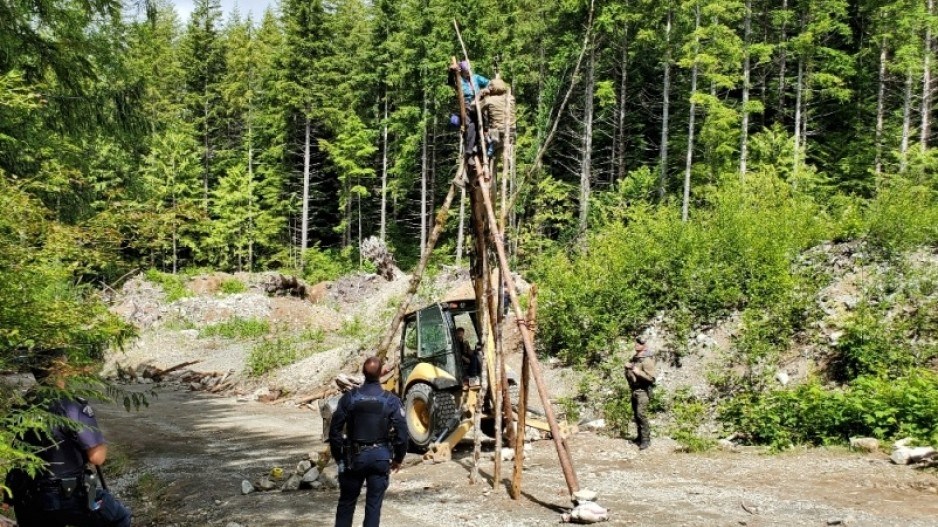Anti-logging protesters could now be free to halt logging on Vancouver Island, after a BC Supreme Court judge rejected Teal Jones' application to extend an injunction against them.
Roughly 1,000 people have been arrested for breaching the injunction, which is set to expire Wednesday.
They have been protesting the logging of old growth forests in Teal Jone's Tree Farm Licence 46 on the West Coast of Vancouver Island, in an area commonly known as Fairy Creek.
Teal Jones had applied to have the injunction extended for another year. But despite acknowledging that Teal Jones is likely to suffer "significant harm" if the injunction were not extended, Justice Douglas Thompson rejected the application, saying the way it has been enforced by the RCMP risks bringing the court into disrepute.
He also appears to put the ball in the court of Crown prosecutors. Whereas they tend not to approve charges when protesters are arrested for violating injunctions, Thompson notes that some of the activities of protesters are illegal, have been escalating, and might warrant criminal charges being laid, regardless of whether there is an injunction in place.
Thompson's main reasons for denying the extension appears to be based on concerns over the way the RCMP have gone about forcing the injunction.
Some of the RCMP's enforcement tactics included restricting journalists from covering the protests -- something Thompson said said was an unacceptable restriction of freedom of the press.
"Moreover, the media’s right of access continues to be improperly constrained," he writes. "One prominent example of the difficulties journalists continue to face is the CBC camera crew that was made to hike seven kilometres in and seven kilometres out, with their heavy equipment, to an area where RCMP enforcement activity was occurring on 26 August 2021."
Thompson said the RCMP's tactics for enforcing the injunction "have led to serious and substantial infringement of civil liberties, including impairment of the freedom of the press to a marked degree."
RCMP have been critcized for using excessive force in removing protesters, who have come up with innovative ways of securing themselves to prevent them from being removed. Thompson did not find the use of force excessive.
"On the totality of the evidence, I find that the police have generally used reasonable force to effect arrests and control crowds, and reasonable means to remove protesters from trenches and devices," he writes.
But Thompson did find the use of exclusion zones on logging roads excessive. Logging roads are generally accessible to the public. But police have set up barricades and extensive exclusion zones to prevent the public, and journalists, from accessing certain points. Thompson said the RCMP's use of exclusion zones are "more expansive than the law permits."
Her also took issue with an order from RCMP commanders that front-line officers remove any identifying names, badges and numbers. RCMP officers have also taken to wearing "thin blue line" patches, which are not offical RCMP insignia -- something Thompson said could be "divisive."
"Putting aside a visceral reaction against seeing Canadian police officers in a position of anonymity from the perspective of their fellow citizens, there are good reasons for insisting on police being precisely identifiable at least by regimental number," Thompson writes.
In a summary of his decision, Thompson writes: "The factors weighing in favour of extension do not outweigh the public interest in protecting the Court from the risk of further depreciation of its reputation."
However, Thompson's ruling suggests Teal Jones and the RCMP are not entirely without legal recourse. Some of the acts committed by protesters -- digging trenches in roads or erecting tripods on public roads -- are illegal. Police and prosecutors don't need an injunction to lay criminal charges when a criminal act is committed.
The question will be whether Crown prosecutors would approve charges. As the judge notes, many of the arrests made to date have been catch-and-release in nature, in which protesters are arrested but never charged.
"Past practice has shown that Provincial Crown Counsel often do not approve criminal charges arising from protests and civil disobedience," Thompson writes. "This is a disincentive for police to rely on the Criminal Code for enforcement in protests and civil disobedience."
He goes on to note, however, that some of the acts committed by protesters might warrant charges being laid.
"Whereas there may have been reason for pessimism about the Crown approving charges in April, the methods of those impeding Teal Cedar have escalated to the point where serious property damage has been done and risk of serious personal injury has emerged," Thompson writes.
"The current policy seems clear enough: while the use of the criminal law may not always be in the public interest in civil disobedience cases, where serious property damage has been caused, or if persistent less serious offending is significantly disrupting public access, or if police safety is jeopardized (as the RCMP assert is the case presently), then such factors favour prosecution."
In a statement to BIV News, Teal Jones says: "We are reviewing the decision, and will be considering options in the coming days.
"Our work in Tree Farm License 46 is important and responsible, vital to sustaining hundreds of jobs in the province and producing products we all rely on every day."




